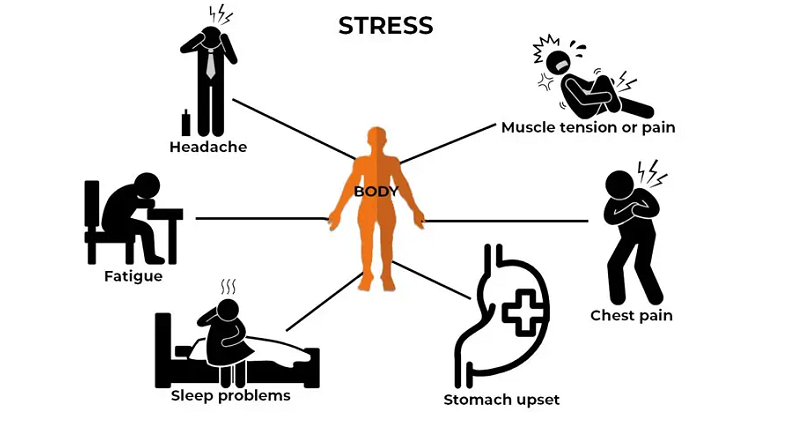
In today’s fast-paced world, stress has become a constant companion for many of us. We often perceive it as a necessary evil, an unavoidable consequence of professional life. However, the toll stress can take on our health, particularly when induced by overwork, should not be underestimated. Here we enhance your understanding of the biological and psychological implications of chronic stress, with a particular emphasis on its ties to the culture of overworking.
Contents
Understanding Stress and Its Causes in the Workplace
As we begin our journey into understanding the dynamics of stress, it is crucial to begin by defining what stress is and exploring its common causes in our workplaces.
Definition of Stress
Stress, in the realm of psychology, refers to a reaction that disturbs our physical or mental equilibrium. It’s our body’s way of responding to any demand or threat. When we feel threatened, our nervous system responds by releasing a flood of stress hormones, which rouse the body for emergency action. This is commonly known as the “fight-or-flight” response.
Brief Explanation of the Body’s Stress Response
When you encounter a perceived threat, your hypothalamus, a tiny region at the base of your brain, sets off an alarm system in your body. Through a combination of nerve and hormonal signals, this system prompts your adrenal glands to release a surge of hormones, including adrenaline and cortisol.
Adrenaline increases your heart rate, elevates your blood pressure, and boosts energy supplies. Cortisol, the primary stress hormone, curbs functions that would be nonessential in a fight or flight situation. It alters immune system responses and suppresses the digestive system, the reproductive system, and growth processes. This complex natural alarm system also communicates with brain regions that control mood, motivation, and fear [1].
Common Causes of Stress in the Workplace
Now that we have an understanding of what stress is and the physiological responses it triggers, let’s look at common stressors in the workplace. These include, but are not limited to:
- Heavy workload: This is one of the most common causes of workplace stress. When employees are unable to cope with the volume of work or its difficulty level, they often feel stressed.
- Job insecurity: In today’s dynamic professional environment, job security is a significant concern. The fear of losing one’s job can lead to chronic stress.
- Workplace relationships: Conflicts with colleagues or managers can lead to a stressful work environment.
- Lack of work-life balance: When work consistently encroaches on personal time, it can lead to feelings of being overwhelmed and heightened stress levels.
Discussion on the Culture of Overworking
In many societies, working long hours without taking adequate breaks has been normalized. This culture of overworking is particularly prevalent in certain sectors and is often seen as a badge of honor or a necessary sacrifice for professional success.
However, overworking can quickly lead to burnout – a state of chronic physical and emotional exhaustion often accompanied by cynicism and feelings of detachment. What’s more, the culture of overworking is a direct threat to the much-needed equilibrium between professional commitments and personal well-being, thereby feeding into the cycle of chronic stress.

The Impact of Chronic Stress on Physical Health
Chronic stress, such as that caused by overworking, can significantly impact your physical health, leading to a variety of complications. It’s essential to understand how and why this happens, which can be a powerful motivator for seeking healthier work-life balance.
Introduction to Chronic Stress
Chronic stress is the response to emotional pressure suffered for a prolonged period over which an individual perceives they have no control. It involves an endocrine system response in which corticosteroids are released. While acute stress can lead to a temporary but rapid surge of energy (due to the release of adrenaline), chronic stress can wear your body down and cause significant health problems [2].
Detailed Analysis of the Effects of Chronic Stress on Various Body Systems
Chronic stress affects numerous bodily systems, with potentially serious long-term health implications.
Cardiovascular System
Under stress, your body releases adrenaline that causes your heart rate and blood pressure to increase and your blood vessels to narrow (vasoconstriction). Such a state, when sustained over a long period due to chronic stress, can lead to hypertension, heart attacks, or strokes.
Immune System
Chronic stress can suppress your immune system and make you more susceptible to infections. Over time, it can also slow wound healing, contribute to obesity, and even accelerate aging.
Digestive System
Stress can affect your digestion, leading to problems like nausea, vomiting, diarrhea or constipation. Over time, chronic stress can also contribute to severe health conditions, such as irritable bowel syndrome (IBS), and stomach ulcers.
Nervous System
If your body is constantly on high alert due to chronic stress, it can lead to anxiety and depression. You might also experience headaches, insomnia, and memory or concentration problems.
Exploring the Long-term Consequences of Chronic Stress on Physical Health
The long-term activation of the stress-response system, especially without adequate rest, can disrupt almost all your body’s processes. This increases the risk of numerous health problems, including heart disease, sleep problems, digestive problems, depression, obesity, and cognitive impairment. Furthermore, stress can worsen the symptoms of any pre-existing conditions and can lead to diminished health or quality of life [3].

The Impact of Chronic Stress on Mental Health
Physical health is not the only casualty of chronic stress. Our mental health is also profoundly affected. Overworking without giving our minds the rest they need can lead to various mental health disorders, ultimately influencing our overall quality of life.
Explanation of the Interplay Between Stress and Mental Health
Mental health and stress are closely intertwined. Our mind’s perception of “stressors” triggers the body’s stress response. However, prolonged periods of stress can lead to mental health issues, which, in turn, can exacerbate our perception of stress, creating a vicious cycle.
Examination of Chronic Stress-Induced Mental Health Disorders
Chronic stress can lead to or exacerbate several mental health disorders. These include, but are not limited to:
Depression
Chronic stress can cause feelings of hopelessness and inadequacy, loss of interest in activities, changes in appetite, and even thoughts of suicide – all common symptoms of depression.
Anxiety Disorders
Chronic stress can lead to an overactive fight-or-flight response that can result in persistent worry, fear, or anxiety. This can manifest as general anxiety disorder, panic disorder, or even phobias.
Post-Traumatic Stress Disorder (PTSD)
Though commonly associated with traumatic events like war or physical assault, PTSD can also occur in individuals who have experienced chronic, long-term stress, including those suffering from occupational burnout.
Understanding the Long-term Impact of Chronic Stress on Mental Well-being
Over time, chronic stress can lead to severe and long-term mental health conditions that require professional treatment. Even if it doesn’t result in a diagnosable mental health disorder, chronic stress can still cause emotional damage. You might experience constant worry, difficulty focusing, or feelings of sadness and anger. These emotional troubles can make it difficult to fulfill your responsibilities, maintain your relationships, and enjoy your life [4].

The Concept of Work-Life Balance and Its Importance
Having understood the profound implications of chronic stress, we now shift our focus to the concept of work-life balance. Achieving a healthy work-life balance can be an effective strategy to mitigate the impact of stress, especially in our overworked lives.
Definition of Work-Life Balance
Work-life balance is a concept that supports the efforts of employees to split their time and energy between work and the other important aspects of their lives. It’s about finding a happy medium between work and personal commitments, pursuits, and relaxation.
Importance of Work-Life Balance for Mental and Physical Health
Work-life balance is not merely a luxury or a desirable condition. It’s a critical aspect of maintaining good mental and physical health. When work starts seeping into your personal life, you have less time for relaxation, self-care, and spending time with loved ones, all of which are vital for overall well-being.
Here’s how a healthy work-life balance can enhance your health:
- Reduces stress: A balanced work-life schedule reduces the chances of stress and burnout since it allows you to take time away from work pressures.
- Improves physical health: With a balanced work schedule, you have more time for self-care activities like exercise, eating well, and getting enough sleep.
- Boosts mental health: Dedicating time for relaxation and doing things you love can significantly enhance your mood and overall mental health.
The Connection Between Work-Life Balance and Productivity
Besides its health benefits, work-life balance also contributes to increased productivity. Studies have consistently shown that well-rested and less-stressed workers are more productive and creative. They’re also more likely to stay with their employers for a longer time, reducing turnover [5].
Practical Strategies to Achieve Work-Life Balance and Manage Stress
Having a comprehensive understanding of the importance of work-life balance, it’s now time to explore practical strategies that can help you achieve this balance and effectively manage stress. These strategies are essential for protecting your physical and mental health while still fulfilling your professional obligations.
Tips for Achieving Work-Life Balance
Achieving a healthy work-life balance might seem daunting, especially in our “always-on” culture. However, these practical tips can help:
- Set clear boundaries: Clearly demarcate your work and personal time. Avoid checking work emails or taking work calls during your personal time unless it’s an emergency.
- Prioritize tasks: Not every task is urgent. Learn to prioritize your tasks based on their importance and deadlines.
- Learn to delegate: Delegation is a key skill that can reduce your workload and stress levels. Remember, you don’t have to do everything yourself.
- Use your vacation time: Don’t let your vacation time go unused. Regular breaks from work help recharge your batteries and reduce burnout.
- Seek flexibility: If your employer offers flexible work arrangements, take advantage of them. This could mean working from home some days or adjusting your start and finish times.
Stress Management Techniques
Even with a perfect work-life balance, stress can sometimes be unavoidable. Here are some techniques to manage it effectively:
- Mindfulness and meditation: Regular mindfulness and meditation can help lower stress levels by promoting relaxation and improving mental clarity.
- Regular exercise: Physical activity releases stress-relieving chemicals called endorphins. Whether it’s a quick walk or a gym workout, find what works for you and make it a part of your routine.
- Healthy diet: A diet rich in fruits, vegetables, lean protein, and whole grains can boost your mood and provide the nutrients necessary to combat the effects of stress.
- Adequate sleep: Quality sleep is crucial for your body to repair and rejuvenate itself. Establish regular sleep patterns and create a restful environment to improve your sleep.
- Social connections: Spend time with loved ones and cultivate supportive relationships. These connections can provide emotional support and help you navigate through stressful times.
References
[1] How Does Overworking Affect Physical and Mental Health?
[2] Can overwork kill you?
[3] Only the overworked die young
[4] The Effect of Long Working Hours and Overtime on Occupational Health
[5] How overwork is literally killing us
